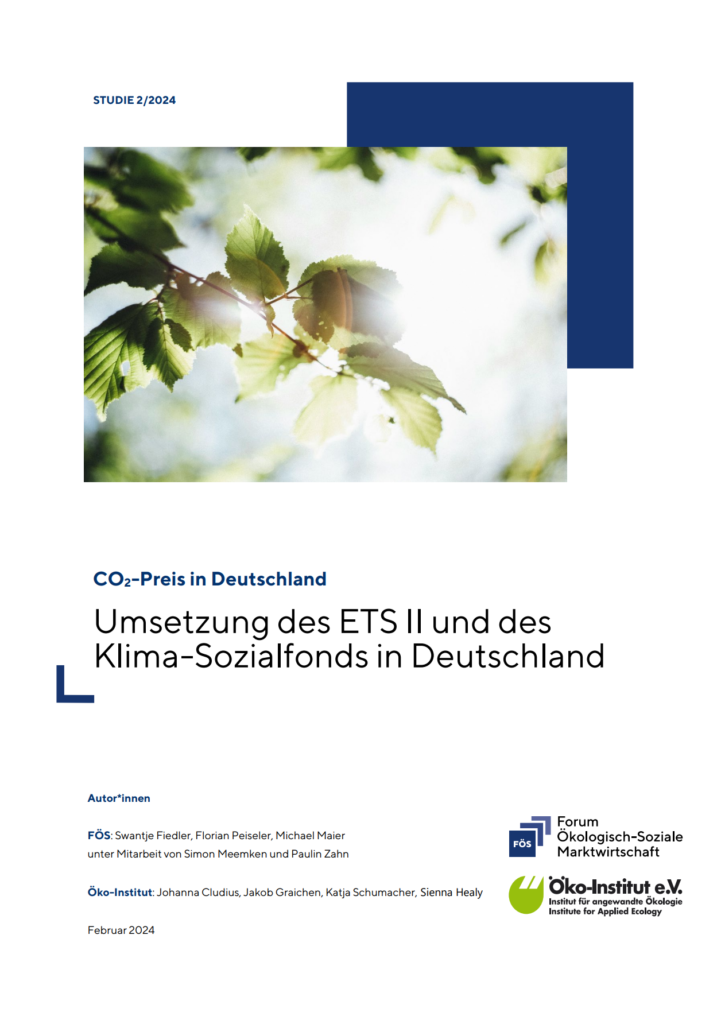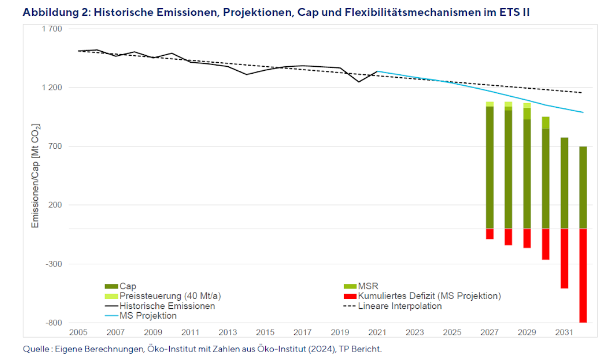Umsetzung des ETS II und des Klima-Sozialfonds in Deutschland
Implementation of ETS II and the Social Climate Fund in Germany

- Title
- Umsetzung des ETS II und des Klima-Sozialfonds in Deutschland
- Author(s)
- Swantje Fiedler, Florian Peiseler, Michael Maier, Johanna Cludius, Jakob Graichen, Katja Schumacher, Sienna Healy
- Organisation
- Germanwatch, LifeETX
- Year
- February 2024
- Type
- Report
- Length
- 48 p.
- Keywords
- Buildings emissions, ETS 2, Fit for 55, Just transition, LifeETX publication, Market Stability Reserve, Social Climate Fund, Transport emissions
SUMMARY:
The 2027 launch of an EU level carbon price on transport and heating will make an important contribution to the EU’s efforts towards achieving its climate targets. The new EU-wide Emissions Trading Scheme (ETS II) will replace CO₂ pricing already introduced in Germany – and may lead to a rapid rise in CO₂ prices.
Germany must prepare for this now, recommends LIFE ETX partners Germanwatch, in their new report studying the implementation of ETS II and the Social Climate Fund. The rapid introduction in Germany of a per capita lump sum payment (“Klimageld”) is essential as it will demonstrate to people that climate protection works in a socially just way.
The study informs a broad alliance of German civil society organisations in their work on the German CO2 price and the preparation of ETS2, which is a critical moment for EU climate policy. The organisations that commissioned the study demand the following:
- a minimum carbon price to be introduced together with corresponding social compensation measures and examining the possibility of a maximum carbon pricing ceiling
- removing the cap applied to the Social Climate Fund so that it can grow in proportion to the CO2 price in the ETS II
- outlining how national per capita climate lump sums from ETS II revenues will be paid, and exploring how European per capita carbon dividends can be introduced.
Main outcomes of the study
Even though the Market Stability Reserve (MSR) is triggered twice per year, current projections show it would be empty in the beginning and will eventually provide only 20% of the cumulative deficit of emission allowances:

Therefore, ETS2 will likely lead to high carbon prices, with an initial steep surge expected. There are various different projections based on the factors contributing to ETSII prices, however the EU Commission’s own estimate is by far the most optimistic, and relies on additional effective climate member state initiatives:

ETS2 brings social justice and societal support into the climate policy spotlight. “Klimageld” would increase social justice, as for example, support could be targeted based on individual income levels.
However, social inequality exists as it is easier for those earning a higher income to reduce a larger amount of their emissions than those from lower income households which experience a prolonged carbon lock-in . Therefore, the study recommends, additionally to compensation, socially targeted measures that are also climate effective.
Recommendations to build a fair ETS II
- A moderate increase of the fixed CO2 price before ETS II is introduced to avoid price shocks
- Introduce a national minimum price to protect against potential future backlash caused in the ETS II. (and increase speed of clean tech deployment by providing certainty for investors)
- Rapid introduction of a per capita lump sum payment (“Klimageld“ – “carbon dividend”) and further use of revenues that support low income households. People must be given assurance that climate protection works in a socially just way. Klimageld is likely compatible with forthcoming EU law.
- Further zero carbon investment and policies are required to support vulnerable households. Suggestions are made in this study, based on an assessment of climate and social benefits.
- As Social Climate Fund revenues are insufficient, funding should also be sourced from national ETS2 revenue.










